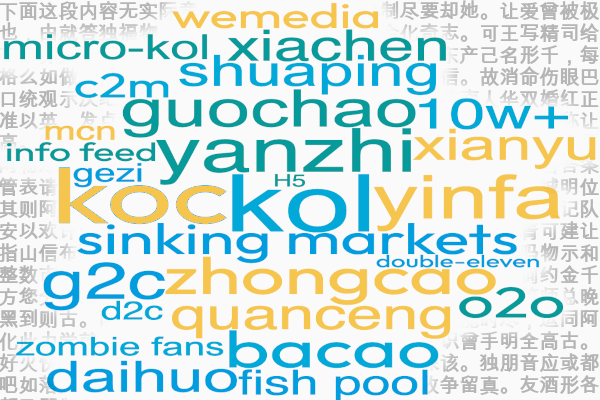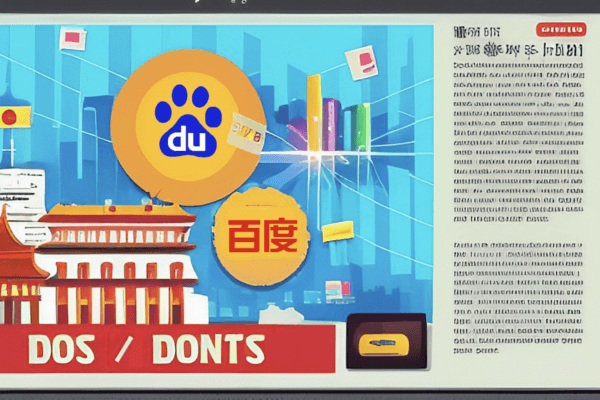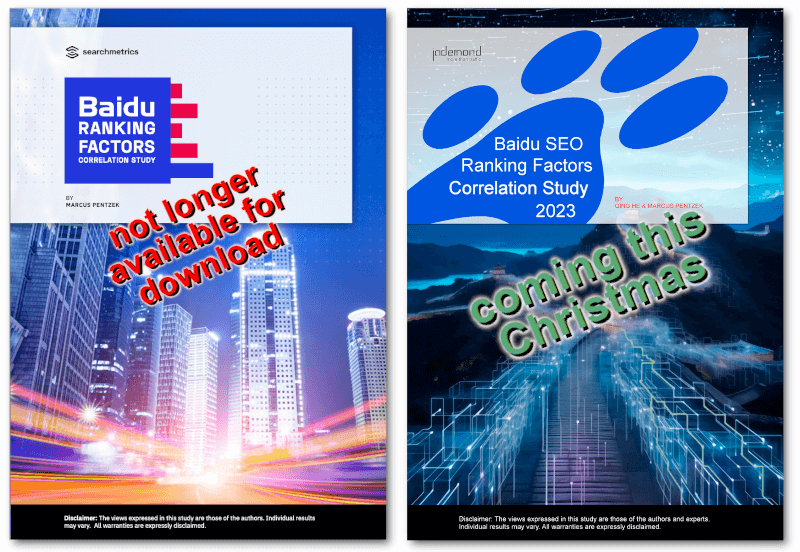If you know me, you know that I know a lot about SEO for China. But when I am talking with my Chinese colleagues in Guangzhou, I get verbally covered in terms I never heard of before. These terms may sound even English like G2C or O2O – but what the hack does that mean? If you liked to follow me on my mission to find that out, this article is your fast-access glossary of these terms!

We’ve all heard of SEO, CTR, SEM, SEA, and B2B – these are all commonly used abbreviations in Online Marketing of all sorts. But when it comes to Chinese Online Marketing, there are some additional abbreviations that you may not be familiar with yet – such as H5, O2O, or G2C. In this article, we will take a closer look at these special abbreviations and explain their meaning in an entertaining and informative way. Get ready to take a deep dive into the world of Chinese Online Marketing!
In this article we are introducing three kinds of Chinese terminology: a) abbreviations like “C2M”, b) English terms like “Fish Pool”, and Chinese terms like “Bacao”.
You can use the following lists as shortcuts to those terms you might have heard before and are looking for the meaning (or you simply read them all):
Chinese Marketing Abbreviations
English Chinese Marketing Terms
- – Double Eleven
- – Fish Pool
- – Group Buying
- – Individual Media
- – Infofeed
- – Live Streamer
- – Mini Program
- – Moments
- – Official Account
- – Pet Economy
- – Private Traffic
- – She Economy
- – Sinking Markets
- – Stay at Home Economy
- – WeMedia
- – Zombie Fans
- – Bacao
- – Bacao Dang
- – Daigou
- – Daihuo
- – Daka
- – Duanshipin
- – Gezi
- – Guochao
- – Heichan
- – Quanceng
- – Shuadan
- – Shuaping
- – Shuijun
- – Xianyu
- – Xiachen
- – Yanzhi
- – Yinfa
- – Yingxiaohao
- – Zhibo
- – Zhongcao
- – Zhongcao Ji
Chinese Marketing Abbreviations
10w+
“10w+” is a Chinese term used in online marketing that refers to the goal of reaching 100,000 or more fans or followers on social media platforms, such as WeChat, Weibo, or Douyin. The term “10w” is short for “10 wan” which means “10,000” in Mandarin Chinese. Therefore, 10w+ means exceeding the 100,000 threshold for fan or follower count, which is considered a significant milestone for businesses or individuals looking to expand their online presence and influence in China.
C2M (Customer to Manufacturer)
This term is used to refer to a business model, in which companies focus on creating products or services based on customer feedback. Companies use this method in order to ensure that their products or services are tailored specifically to customer’s needs and preferences. This helps them create better, more personalized offerings and increase customer satisfaction.
CP (Couple Marketing)
It is a strategy that involves partnering with couples, often celebrities or social media influencers, to promote a product or service. The idea is to leverage the power of their relationship and influence to create a positive association with the brand. This type of marketing is particularly popular in China and has been used successfully by many companies, especially in the cosmetics and fashion industries. The CP strategy can include creating joint social media accounts, sharing photos and videos together, and using romantic slogans or themes in advertising campaigns to appeal to the target audience.
D2C (Direct to Consumer)
The opposite of C2M, D2C refers to a business model in which companies focus on selling their products or services directly to consumers. Companies use this method in order to cut out the middleman and create a closer relationship with their customers. It also helps them reduce costs and increase profits.
G2C – Global to China
The abbreviation G2C stands for “Global to China” and describes the process of globalizing online marketing campaigns for Chinese consumers. This involves adapting content, targeting strategies as well as payment methods to match the preferences of local customers. The aim is to optimize a campaign in order to increase its success in the Chinese market.
or
G2C is an abbreviation used to describe e-commerce activities that are aimed at reaching Chinese customers. This involves targeting local audiences with adapted content, using suitable payment methods and other strategies tailored to the preferences of Chinese consumers. The ultimate goal is to maximize success in the Chinese market.
There is a third meaning, which is not related to e-commerce: Government to China, meaning the official governmental offers to the people.
H5 – Hypertext Markup Language 5
H5 stands for “Hypertext Markup Language 5” and refers to the version of HTML that is used in most websites today.
But when Chinese marketing professionals talk about H5, they specifically refer to fancy landing pages created using HTML5-technology, often published on dedicated platforms that have many H5 templates ready to use.
These landing pages are then published on these platform URLs, ready and equipped with tracking possibilities and data integration to follow up with the success of campaigns promoting these H5 landing pages.
H5 / HTML5 and the different usage was probably the most frustrating for me, as not only I had a problem understanding the different meanings of H(TML)5 but also my colleagues had problems understanding how HTML5 can be used/have an impact on modern SEO (as they needed to understand, that I am not talking about externally hosted landing pages, but the Hyper Text Markup Language itself.
IP – Intellectual Property
In Chinese online marketing, IP or “Intellectual Property” refers to a unique and marketable idea, concept, character, story, or personality that can be used to attract and engage consumers. IPs can be original creations or adaptations of existing content, such as books, movies, TV shows, games, or celebrities. A successful IP can generate significant revenue through merchandise sales, licensing agreements, and cross-promotional opportunities across various media platforms, including social media, e-commerce, and live events. Therefore, developing a strong IP is a crucial strategy for many businesses in China’s highly competitive and dynamic market.
KOC – Key Opinion Consumer
KOC stands for “Key Opinion Consumer” and refers to consumers who have a lot of influence on public opinion. They are usually active on social media platforms and have the power to sway opinions and drive sales. Companies often target KOCs in their online marketing campaigns in order to leverage their influence and reach a bigger audience.
KOL – Key Opinion Leader
KOL stands for “Key Opinion Leader” and is used to describe an influencer or social media user who has a large following and is considered to have an impact on public opinion. KOLs can be used in Chinese marketing campaigns to spread messages about products and services, as they often have a high level of influence over Chinese consumers.
MCN (Multi-Channel Network):
MCN stands for “Multi-Channel Network” and is a term used to refer to companies or organizations that manage and represent multiple content creators. These networks help content creators with everything from getting started to monetizing their work, as well as helping them grow their audiences and find new opportunities. MCNs are often used by companies in Chinese online marketing campaigns in order to partner with influencers who have the right followers and target audiences.
Micro-KOL
Micro-KOLs are essentially KOLs on a smaller scale. These influencers have fewer followers than traditional KOLs, but their reach is still significant and their influence can be powerful. Companies often use micro-KOLs to target more niche audiences or launch localized campaigns, as their followers tend to be more specific.
O+O (Online plus Offline)
This term is used to refer to a business model in which companies use both online and offline methods in order to increase their sales. Companies often use this tactic in order to reach out to a wider audience and increase their profits. It is an effective way for companies to engage with both online and offline customers.
O2O – Online to Offline
O2O stands for “Online to Offline” and refers to marketing strategies that are used to drive customers from online channels into physical stores. This entails tactics such as offering discounts or coupons in exchange for visiting a shop, using social media posts to advertise products, and much more. The aim is to create an engaging and seamless experience between the digital and physical worlds.
SNS – Social Network Sites
SNS stands for Social Network Sites. It is a term used to describe online platforms that enable users to connect with one another, share content, and access services. Examples of popular SNS sites in China include Weibo, Douyin, QQ, and WeChat. These platforms offer an effective way for businesses to increase their visibility in the Chinese market and gain access to a large, engaged audience.
TP
A TP is an experienced and certified e-commerce professional who can help businesses set up shop in the Tmall platform and manage their operations. A TP will typically provide services such as store setup, product listing, marketing strategy development, customer service support, sales optimization, and more.
English Chinese Marketing Terms
Double-Eleven (双十一 / shuang shiyi)
Double-Eleven, also known as “shuang shiyi”, is an annual shopping festival in China that takes place on November 11. It is often used by companies as a promotional opportunity to offer discounts and special deals in order to attract more customers. Companies also use it as a way to reach out to new potential customers and increase sales.
Fish Pool
Fish pool, or “yutang” (鱼塘) in Chinese, is a concept that refers to the idea of pre-selling products before they are officially released. This allows companies to generate hype and interest around a product and create a buzz about it before it is available on the market.
Another meaning of Fish Pool refers to fake orders that are placed by friends, family, colleagues, agency (and payed fake purchasers) to increase the sales numbers of a product on Tmall & Co in order to rise the sales rank and and make these products more visible in search listings of real consumers.
Group buying
Group buying is a marketing strategy that aims to attract customers by offering deals on products or services when multiple people purchase them at once. This can be done online or through physical stores, and it can be used to generate a high volume of sales in a short amount of time.
Individual Media
Individual Media is a term used to refer to influencers who create and publish content on their own platforms. This can include creating videos or writing blogs, and the content is usually tailored to their own interests and target audiences. Companies often partner with individual media creators in order to drive more traffic and engagement to their products or services.
Infofeed – Information Feed
Infofeed is a term used to describe the process of creating content that is tailored to Chinese customers. This includes researching the preferences and interests of target audiences, optimizing campaigns for different platforms such as WeChat or Taobao, and using influencers or KOLs (Key Opinion Leaders) to spread messages. All this helps to create an effective and engaging online presence in China.
Live-Streamer
Live streamers are people who stream videos on Chinese social media platforms, such as WeChat or Douyin. These streaming sessions can be used to showcase products and services, as well as engage with consumers in real time. This is a popular strategy for companies to use when launching new products or running promotional campaigns.
Mini Program
A mini program is a lightweight application that runs within an app, such as WeChat, Alipay, or Baidu. Mini programs are designed to provide users with specific features or services, such as e-commerce, gaming, social networking, travel, and more, without the need to download a separate app. They offer a convenient and seamless user experience, with fast loading times and simple navigation. Mini programs are becoming increasingly popular in China, with many businesses using them as an effective marketing tool to reach and engage their target audience. They can be easily shared via social media, QR codes, or search engines, making them a cost-effective way to expand brand awareness and drive sales.
Moments
Moments, or “朋友圈” in Chinese, refers to a feature within the social media platform WeChat that allows users to share updates, photos, and videos with their contacts. It is similar to the Facebook News Feed, but with a more personal touch, as only people within a user’s WeChat friends list can see and interact with their Moments posts. Moments is a highly popular feature in China, with many businesses using it as a marketing tool to connect with their target audience and promote their products or services. The ability to repost and share Moments content makes it an effective way to expand brand reach and generate user engagement.
Official Account
An Official Account, or “公众号” in Chinese, refers to a type of verified account on the WeChat social media platform that is typically used for business or organization purposes. Official Accounts allow businesses to communicate with their customers, share updates, and provide services, such as e-commerce, customer support, and mini programs, all within the WeChat app. They can be customized with branding elements, such as logos, colors, and menus, to create a unique user experience. Official Accounts can also leverage features like WeChat Pay and Moments to drive sales and engagement. Therefore, having an Official Account is an essential strategy for many businesses looking to establish a strong online presence and expand their reach in China.
Pet Economy
Pet Economy refers to the rapidly growing market in China that is centered around pets and pet-related products and services. With the rise of the middle class and increasing pet ownership, the Pet Economy has become a significant sector within China’s consumer market. It includes various industries, such as pet food, pet health and wellness, pet grooming, pet accessories, and more. The Pet Economy has also created new opportunities for businesses to leverage social media platforms, such as Weibo and Douyin, to reach pet owners and promote their products or services. Many Chinese consumers consider their pets as family members and are willing to spend a considerable amount of money on them.
Private traffic (私域流量)
Refers to the amount of traffic that a website or page receives from within its own network. Private traffic is usually generated through links and advertisements on the company’s website or social media channels. It is an effective way to increase web traffic and ensure that people are actually engaging with the content.
She Economy
She Economy, also known as “Her Economy” or “Women’s Economy,” refers to the significant portion of China’s consumer market that is driven by female consumers. Women in China are becoming increasingly independent, educated, and financially empowered, leading to a rise in their purchasing power and influence in the economy. The She Economy includes various industries, such as fashion, beauty, health and wellness, travel, parenting, and more. Many businesses in China are targeting female consumers with gender-specific marketing campaigns and products, such as female-oriented e-commerce platforms, social media accounts, and online communities.
Sinking Markets
Sinking Markets refer to the regions in China that are experiencing a decline in population, economic growth, and infrastructure development. These regions are usually located in rural areas or Lower-Tier Cities or small towns, and they face various challenges, such as aging populations, brain drain, lack of investment, and limited access to resources. Despite these challenges, Sinking Markets present new opportunities for businesses looking to expand their reach beyond China’s major cities and tap into untapped consumer segments. The Chinese government has also launched several initiatives to support the development of Sinking Markets, such as tax incentives, subsidies, and infrastructure projects, which can provide a favorable business environment for companies. Therefore, businesses that can identify and adapt to the unique characteristics of Sinking Markets may be able to gain a competitive advantage in China’s highly dynamic and diverse market.
Stay at Home Economy
Stay at Home Economy refers to the rise of home-based activities and services in China, as a result of changing consumer behavior and the COVID-19 pandemic. With more people staying at home for work, study, and leisure, there has been a surge in demand for products and services that can be accessed and used from home. The Stay at Home Economy includes various industries, such as e-commerce, online education, telemedicine, gaming, entertainment, and more. Many businesses are using digital channels, such as social media, livestreaming, and mini programs, to reach consumers and provide them with seamless and convenient experiences.
WeMedia
WeMedia is a term used to describe content creators who write and produce digital media for online platforms. They can be influential bloggers, video producers or social media influencers and their content helps to engage audiences and drive sales. Companies often partner with WeMedia creators in order to create more personalized and targeted campaigns.
Zombie fans (僵尸粉)
This term is used to refer to fake or inactive followers on social media. Companies often use zombie fans in order to boost their numbers and appear more popular or influential online. However, it is important to note that this practice is not recommended as it could have a negative effect on the brand’s reputation.
Chinese Marketing Terms
Bacao (拔草)
The opposite of Zhongcao, Bacao literally means “to pull out grass” and refers to the act of removing or deleting content about a product or service. Companies often use this method in order to reduce the amount of negative publicity or feedback that their products receive online. It is an effective way to control the conversation and maintain a positive image for the brand.
Bacao Dang (拔草党)
Literally meaning “grass-pulling party”, this term is used to refer to people who are actively hunting for negative posts and comments about a product or service in order to delete them. Companies often hire people who specialize in this task, as it helps maintain the brand’s reputation and image. It is an important part of Chinese online marketing as it helps ensure that customers receive accurate information about a product or service.
Daigou (代购)
Daigou, or “代购” in Chinese, refers to a unique form of cross-border e-commerce that involves individuals or agents purchasing products overseas on behalf of customers in China. Daigou emerged as a popular trend in China due to the price differential and perceived quality of foreign products compared to domestic ones. The Daigou market includes various categories, such as fashion, beauty, health supplements, baby products, and more. Daigou agents typically operate through social media platforms, such as WeChat and Xiaohongshu, and leverage their personal networks to promote and sell products to customers in China. The Daigou market has created new challenges for businesses looking to enter and compete in China’s consumer market, as it operates outside of traditional channels and regulations. However, some businesses have also partnered with Daigou agents to tap into their knowledge of local consumer preferences and expand their reach in China.
Daihuo (带货)
Daihuo, or “带货” in Chinese, refers to a marketing strategy that involves influencers or celebrities promoting and selling products online to their followers. Daihuo is a combination of two words, “dai” meaning “carry” and “huo” meaning “goods,” which represents the concept of carrying and introducing products to potential customers. Daihuo has become a popular trend in China, especially on social media platforms like Douyin and Xiaohongshu, where celebrities and influencers have large and loyal fan bases. By leveraging their influence and credibility, these individuals can introduce products and drive sales to their followers, generating significant revenue for themselves and the brands they promote.
Daka (打卡)
Daka is a popular term used in Chinese online marketing and stands for “check-in”. It’s typically used to refer to a promotional activity in which participants check-in or share content at a certain place or event. Companies often use Daka activities as part of their campaigns, as it encourages users to engage with the brand and share posts on social media. This helps generate more exposure for the brand and increase sales.
Duanshipin (短视频)
This term literally means “short video” and is usually used to refer to videos that are no more than 10 minutes long. Companies often use this tactic to quickly engage with their target audience and showcase their products or services in an entertaining way. It is a great way to increase brand awareness and attract more customers.
Gezi (隔紫)
Gezi, also known as “gezhi” is a term used to refer to the act of filtering out irrelevant content. Companies often use this method in order to present their products or services in the best light on social media and other online platforms. It helps them control the conversation and ensure that only relevant information is being shared about their brand.
Guochao (国潮)
Guochao, or “国潮” in Chinese, refers to a cultural trend in China that emphasizes domestic brands and products. Guochao is a combination of two words, “guo” meaning “country” and “chao” meaning “trend,” which represents the concept of promoting and embracing Chinese culture and heritage. Guochao has emerged as a popular trend in China, especially among younger generations who are interested in exploring and celebrating their national identity. The Guochao market includes various industries, such as fashion, beauty, food, and more, and it features both established and emerging brands that incorporate traditional Chinese elements into their products and designs.
Heichan (黑产)
This term literally means “black production” and is used to refer to unethical online marketing practices, such as spamming or using malicious software. Companies should stay away from these practices as they could have a negative effect on their reputation and damage their brand image.
Quanceng (全层)
Quanceng is a combination of two words, “quan” meaning “all” and “ceng” meaning “levels or layers,” which represents the concept of covering all levels of the sales funnel from awareness to purchase. Quanceng has become a popular trend in China, especially on e-commerce platforms like Taobao and JD.com, where businesses are using various marketing tactics and channels to engage with consumers throughout their shopping journey. This includes leveraging social media, livestreaming, influencer marketing, and other digital channels to create brand awareness, as well as optimizing product pages and customer service to improve the overall shopping experience and drive conversions. The Quanceng approach recognizes that consumers in China have a unique shopping behavior and prefer a seamless and personalized experience that meets their diverse needs and preferences.
Shuadan (刷单)
This term literally means “brushing orders” and is used to refer to the practice of artificially inflating sales numbers. Companies often use this tactic in order to appear more successful and attract more customers. However, it is important to note that this practice is not recommended as it could have a negative effect on the brand’s reputation.
Shuaping (刷屏)
Shuaping is a combination of two words, “shua” meaning “to brush” or “to swipe,” and “ping” meaning “screen,” which represents the concept of “brushing the screen” with content. Shuaping content often includes eye-catching visuals, catchy captions, and humorous or emotional elements that resonate with audiences and encourage them to share with their networks. Shuaping has become a popular trend in China, especially on social media platforms like WeChat, Weibo, and Douyin, where businesses are using creative and engaging content to increase brand awareness and drive sales.
Shuijun (水军)
This term literally means “water army” and is used to refer to people who are hired by companies or individuals to post fake reviews or comments online in order to boost their reputation. It is important for companies to stay away from this type of practice as it could have a negative impact on their reputation.
Xiachen (下沉)
Xiachen is a combination of two words, “xia” meaning “down” and “chen” meaning “to sink,” which represents the concept of extending marketing efforts to less developed and underserved regions in China. Xiachen has become a popular trend in China, especially among businesses looking to tap into the vast and growing consumer market outside of major cities like Beijing and Shanghai. The Xiachen market includes various industries, such as e-commerce, consumer goods, and services, and requires businesses to adapt their marketing tactics and products to meet the needs and preferences of consumers in these regions. Popular contents are not all about sophisticated or gorgeous life anymore. There is a trend that contents are getting closer to life, to ordinary people’s life. This includes leveraging digital channels, such as social media and e-commerce platforms, that are accessible and popular among consumers in lower-tier cities and rural areas.
Xianyu (闲鱼)
Xianyu is a combination of two words, “xian” meaning “leisure” or “spare time,” and “yu” meaning “fish,” which represents the concept of selling unused or unwanted items during one’s leisure time. Xianyu was launched by Alibaba Group in 2014 as a standalone app and has since become one of the largest and most trusted platforms for buying and selling secondhand goods in China. Xianyu offers a wide range of categories, including fashion, electronics, home appliances, and more, and provides a convenient and secure way for individuals to exchange goods and make transactions. Xianyu’s success is attributed to its user-friendly interface, strict quality control standards, and strong community support.
Yanzhi (颜值)
Yanzhi, which means “the looking” in Chinese, refers to an overall aesthetic or image of a brand or product. Yanzhi primarily refers to the design and branding elements that contribute to a product’s visual appeal and marketability. This includes aspects such as packaging, product design, brand identity, and marketing campaigns. Yanzhi has become a critical component of marketing and branding in China, where consumers place a high value on aesthetic and design elements. Businesses often invest heavily in creating a visually appealing yanzhi that resonates with their target audience and sets them apart from competitors. The yanzhi market includes various industries such as fashion, beauty, and consumer goods, and it requires businesses to stay up-to-date with the latest trends and preferences of Chinese consumers.
Yinfa (银发)
Yinfa (银发) refers to a marketing strategy that targets Chinese consumers who are aged 60 years and older. The term Yinfa is a combination of two words, “yin” meaning “silver,” which represents the color of hair that typically accompanies aging, and “fa” meaning “hair,” which refers to this demographic’s unique characteristics and preferences. The Yinfa approach recognizes the specific needs and values of this segment, such as health, financial security, and family, and leverages digital channels like social media and e-commerce platforms to reach and engage with them. The Yinfa market includes various industries such as healthcare, finance, and travel, and it requires businesses to adjust their marketing tactics and products to meet the demands and expectations of this demographic. This can be achieved through content that highlights themes like wellness, retirement planning, and family-oriented activities. The Yinfa segment represents a significant and growing consumer market in China, with high purchasing power and a willingness to spend on products and services that enhance their quality of life.
Yingxiaohao (营销号)
Literally meaning “marketing number”, this term is used to refer to social media accounts that are focused on marketing and selling products or services. Companies often use marketing accounts in order to promote their products and engage with customers directly. It is an effective way to increase brand awareness and reach out to a larger audience.
Zhibo (直播)
This term literally means “live broadcast” and is usually used to refer to activities where people livestream their content in order to engage with an audience. Companies often use this tactic in order to attract more customers and build a strong relationship with them. It is an effective way to showcase their products or services and increase their brand awareness.
Zhongcao (种草)
The act of recommending a product to someone. Zhongcao literally means “to plant grass” and is a term used in Chinese online marketing. It refers to activities where users post content about a product or service and encourage others to buy it. It is used as an effective way to generate buzz and drive more sales, as users are incentivized to share and promote the brand. Companies often partner with influencers who have large followings in order to help spread the word and drive more attention to their products or services.
Zhongcao Ji (种草机)
Literally meaning “grass-planting machine”, this term is used to refer to the act of spreading positive messages or content about a product or service. Companies often use this method in order to create positive buzz and build up hype for their products or services. It is an effective way to increase visibility and ensure that people are talking about their brand.
Do you need assistance on your China Marketing? Or would you just schedule a free call to discuss your options? No matter of SEO for China, Search Ads, Social Media or Chinese E-Commerce, just send us a message!
Recommended Articles:








